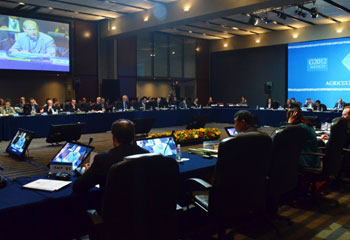In June, the leaders of the G20 will discuss the recommendations made by the Vice-Ministers of Agriculture and other entities such as IICA for strengthening the agricultural sector and increasing its contribution to food production worldwide.
Mexico City, May 2012 (IICA). The Deputy Ministers of Agriculture of the Group of 20 (G20) recommended to the leaders of the principal economies of the world that they broaden cooperation in research and transfer of technology, as well as increase investment in agriculture through public-private alliances, in order to achieve global food security.
Meeting in Mexico City on May 17 and 18, the Deputy Ministers drafted a report to the Presidents and Heads of State and Government of the G20, to provide political impetus at the highest level, for an increase in the sustainable production of food.

The meeting also brought together invited countries and organizations such the Inter-American Institute for Cooperation on Agriculture (IICA).
The recommendations to be forwarded to the G20 leaders, according to Francisco Mayorga, Minister of Agriculture, Rural Development, Fisheries and Food of Mexico (SAGARPA) “will be a way to develop and implement strategies to guarantee the right to food and create conditions for the sustained growth of agricultural production worldwide”.
Victor M. Villalobos, Director General of IICA expressed his satisfaction with the similarity of objectives between the G20 and that Institute.
“I note with great enthusiasm that a group as powerful as the G20 is quite aware that innovation is an important and priority issue for agricultural development. We hope that this will mean greater involvement of institutions such as ours which have to spearhead the use of this technology for resolving problems in the field”, he continued.
Among the tasks required for achieving food security worldwide, the Deputy Ministers approved guidelines for the use of genetic resources, better care and management of water resources, promotion of sustainable agriculture and growth in productivity.
The Director General of IICA highlighted two more topics that were discussed by the Deputy Ministers, among them the creation of a group of scientific leaders, which demonstrates the interest of the G20 for a platform for expressing the knowledge derived from science; and tropical agriculture, which would play a fundamental role in the future of food security.
A previous meeting of Deputy Ministers of Agriculture held in April, resulted in the completion of the International Organizations on Sustainable Growth and Agricultural Productivity and Narrowing of the Gap for Small-Scale Producers Report. This report contains specific recommendations for the leaders of the powerful economics.
The reports of the deputy-ministerial meetings were sent to the sherpas (who carry out the preparatory work for the G20 summits) for further discussion at the Los Cabos meeting on June 18 and 19, 2012.
The G20 includes five IICA Member States: Argentina, Brazil, Canada, Mexico and the United States, while Chile and Colombia were invited as special guest nations.
In addition to the states mentioned above, the meeting brought together Vice-Ministers representing Australia, China, European Union, France, Germany, India, Indonesia, Italy, Japan, Russia, Republic of Korea, Saudi Arabia, South Africa, Turkey and the United Kingdom.
Also invited were Cambodia, Colombia, Chile, Denmark, the Netherlands, New Zealand and Spain. International organizations included the FAO, IFAD, IICA, OECD, World Bank and WTO.
The Director General of IICA was accompanied to the meeting of Deputy Ministers by Gino Buzzetti, Representative of the Institute in Mexico, Miguel Garcia Winder, Manager of the Agribusiness and Commercialization Program and Franklin Marin, Coordinator of the Center for the Promotion of Technical Capacities and Leadership.
Given the importance of the meeting of leaders, and with the aim of sharing the deliberations of the G20 with the entire hemisphere, IICA and SAGARPA created a virtual thematic network to provide a platform that is constantly being updated in the service of academics, researchers, professionals and producers.
The network can be accessed at the following address: www.redagriculturaG20.net.
Más información:
miguel.garcia@iica.int











